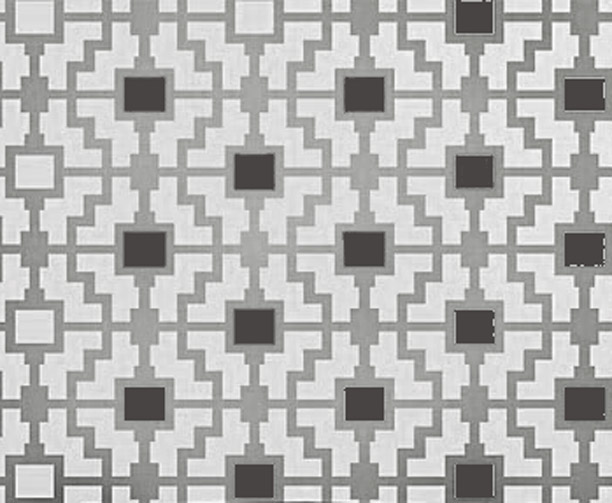It's hard to believe this is what our kitchen looked like before we purchased our home.
After some demo, new cabinets, french doors, paint, fixtures, and of course Nest Studio Hardware, we replaced and primed the plywood subfloor.
I received my Shipibo Allover Stencil from Cutting Edge Stencils and flattened it out to prepare for the stenciling process.
I ended up having to use a brush and doing some hand fudging. Here is what it looked like further along.
By the time I finished all the edges and corners the center was dry enough to walk on. I was pretty happy with the results. So I opted to use the dark charcoal grey that I had used for the glaze on the rectangles rather than the black paint in the original concept.
A few days later, I moved on to the next step -- clear coat. I put on two coats of Polyurethane.
In the end it turned out great and proved to be pretty durable. It was also way less expensive that going the route of encaustic tile. I give stenciling two thumbs up -- a huge impact at a small cost - which is why I decided to do it again in my current kitchen. Stay tuned for a play by play on that project coming up!
I started at the top end toward the middle of the kitchen and then worked my way out using a dry firm foam roller applying very little pressure as per the instructions. Because I wasn't worried about an even coat - I wanted a patina'd look - the first few rows went fairly quickly.
Because I wasn't worried about an even coat - I wanted a patina'd look - the first few rows went fairly quickly.
The edges and corners, however, got a little rough. Paint was starting to goop under the stencil despite how little pressure I was using and I spent quite a bit of time going back and wiping both the floor and the stencil. The edges weren't as crisp because of the goopage and the fact that paint started drying around the edges of the stencil openings caused lines to be less straight. By far the most challenging part was going in and out of the corners. Because I wasn't worried about an even coat - I wanted a patina'd look - the first few rows went fairly quickly.
Because I wasn't worried about an even coat - I wanted a patina'd look - the first few rows went fairly quickly.I ended up having to use a brush and doing some hand fudging. Here is what it looked like further along.
By the time I finished all the edges and corners the center was dry enough to walk on. I was pretty happy with the results. So I opted to use the dark charcoal grey that I had used for the glaze on the rectangles rather than the black paint in the original concept.
A few days later, I moved on to the next step -- clear coat. I put on two coats of Polyurethane.
In the end it turned out great and proved to be pretty durable. It was also way less expensive that going the route of encaustic tile. I give stenciling two thumbs up -- a huge impact at a small cost - which is why I decided to do it again in my current kitchen. Stay tuned for a play by play on that project coming up!
























































